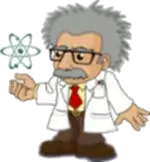Natural numbers - practice problems - page 6 of 92
Number of problems found: 1826
- Cardinals and robins
 Lee saw c cardinals and 5 robins in his yard. Write the expression that shows the number of birds Lee saw in all.
Lee saw c cardinals and 5 robins in his yard. Write the expression that shows the number of birds Lee saw in all. - Solve 25
 Solve for a in (a+8)/2-3(a+10)/5=1.
Solve for a in (a+8)/2-3(a+10)/5=1. - The remainder 3
 The remainder is 31 when dividing a number by 45. What would the remainder be if the same number were divided by 15?
The remainder is 31 when dividing a number by 45. What would the remainder be if the same number were divided by 15? - Cows and hens
 In a group of cows and hens, the number of legs is 14, more than twice the number of heads. Find the number of cows.
In a group of cows and hens, the number of legs is 14, more than twice the number of heads. Find the number of cows. - Cupcakes
 Keia and Hiro made a total of 27 cupcakes. Keia made 2 times as many cupcakes as Hiro. How many cupcakes did Hiro make?
Keia and Hiro made a total of 27 cupcakes. Keia made 2 times as many cupcakes as Hiro. How many cupcakes did Hiro make? - Heads and legs 2
 There are a number of unspecified numbers of cows and hens in a den. If there are a total of 30 heads and 80 legs in the den, find the number of cows and hens in the den.
There are a number of unspecified numbers of cows and hens in a den. If there are a total of 30 heads and 80 legs in the den, find the number of cows and hens in the den. - Factorial divisible by 75
 Find the least positive integer n such that n! is divisible by 75.
Find the least positive integer n such that n! is divisible by 75. - The sum 50
 The sum of five consecutive integers is 385. Which one of these five integers is prime?
The sum of five consecutive integers is 385. Which one of these five integers is prime? - Five and four
 Five divided by four times the number is 0.25. What is that number?
Five divided by four times the number is 0.25. What is that number? - Twice the unknown
 I am twice a number. If -8 is subtracted from me, the answer is 6. What am I?
I am twice a number. If -8 is subtracted from me, the answer is 6. What am I? - The sum 32
 The sum of three consecutive odd numbers is 33. What are the three consecutive odd numbers?
The sum of three consecutive odd numbers is 33. What are the three consecutive odd numbers? - Simple equation 12
 Three times a number divided by 2 plus 5 equals 20. Find the number.
Three times a number divided by 2 plus 5 equals 20. Find the number. - Divisor of two numbers
 Find the (greatest common) divisor of 18 and 45.
Find the (greatest common) divisor of 18 and 45. - Evaluate expressions
 Which expression equals 12? ...
Which expression equals 12? ... - The difference 4
 The difference between four times a number and five is the same as three more than twice a number. Find the number.
The difference between four times a number and five is the same as three more than twice a number. Find the number. - The remainder
 Find the remainder if 17²00 is divided by 18.
Find the remainder if 17²00 is divided by 18. - Twice 2
 Twice the difference between a number and 3 is equal to three times the sum of the number and 8. Find the number.
Twice the difference between a number and 3 is equal to three times the sum of the number and 8. Find the number. - I added
 I added 10 to 3 times a number; the result is equal to 4 times the number. What is the number?
I added 10 to 3 times a number; the result is equal to 4 times the number. What is the number? - The number 88
 Write the number 88 as a product of prime factors.
Write the number 88 as a product of prime factors. - The difference 6
 The difference between a number and 15 is multiplied by -3, and the result is - 30
The difference between a number and 15 is multiplied by -3, and the result is - 30
Do you have homework that you need help solving? Ask a question, and we will try to solve it. Solving math problems.
